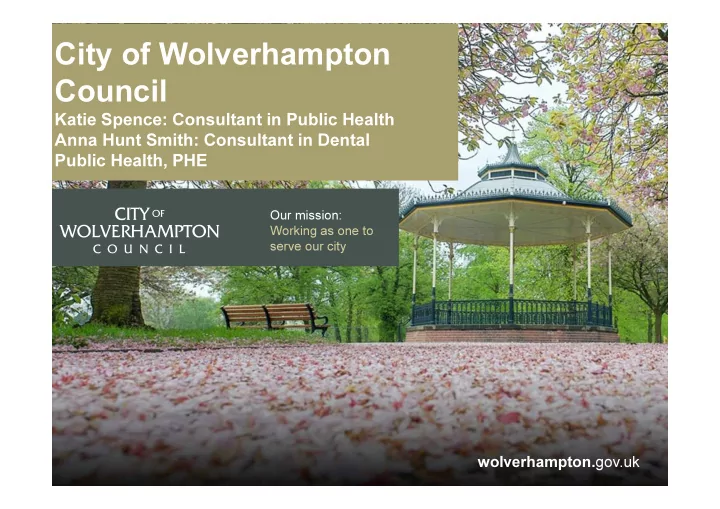

City of Wolverhampton Council Katie Spence: Consultant in Public Health Anna Hunt Smith: Consultant in Dental Public Health, PHE Our mission: Working as one to serve our city wolverhampton. gov.uk
Oral health in Children: Background • With the transfer of Public Health to Local Authorities in April 2013, LAs statutorily required to provide or commission oral health promotion programmes to improve the health of the local population • They are required to provide or commission oral health surveys • NHS England commission dental services, which includes some oral health promotion services • Vast majority of Wolverhampton water is fluoridated
Why oral health is important:
Impact of Poor Oral Health
National trends 2014
Severe poor oral health
Hospital Admissions
Inequalities in oral health
Local Oral Health Survey of 5 and 3 year olds • Biennial national survey of 5 year olds • Dental examination on sample of children in schools • Most recent survey 2015 sampled 2,089 (64.4% ) of 5 yr olds Wolverhampton • 27.8% experienced tooth decayed, missing or extracted teeth, which is above the national average of 24.7% • In 2013 a survey of 3 year olds via nurseries showed 13% had decayed, missing or extracted teeth.
Wolverhampton 5 yr olds survey 2014-15 compared to West Midlands & England
5 year olds participating in the Oral Health Survey in 2014-15 by ward .
Percentage of decay in 5 year olds surveyed, by ward % with decay experience (dmft>0) 40-49% 30-39% 20-29% 10-19%
Prevalence of caries by deprivation for Wolverhampton
Extractions2-16 years of age, at New Cross Hospital, 2007-12 • Increasing number of extractions over that time • More teeth were extracted in boys than girls • White British accounted for the highest proportion, and the second largest was those of South Asian origin • The mean age of children attending decreased over that period • Number of primary teeth extracted has increased, and the number of permanent teeth has decreased. • 3.2% returned for a repeat Extraction under General Anaesthetic within three years
Dental extractions 0-19 year olds in Wolverhampton compared to West Midlands
Dental extractions trends…
Wolverhampton Community Dental Service Includes children and adults • With severe learning disabilities • With severe autistic spectrum disorders • With physical disabilities and wheel chair users • With severe mental health problems • With a dental phobia • Who are engaging in substance misuse • From socially excluded groups • Elderly and frail adults living in care homes • Looked after children • Children with high treatment needs who are difficult to manage
PHE Toolkit for Prevention Ten Key Areas for Action Council commissioned and supported progress Guidance for primary dental teams Principles of toothbrushing for oral health Training of frontline line staff Development of local resources, such as summary card Distribution of Dental packs Establishing supervised toothbrushing schemes Increasing fluoride availability Water Fluoridation Ensure people are using toothpastes with correct concentration of fluoride Promotion of fluoride varnish Identifying vulnerable groups who may benefit from targeted fluoride varnish Healthy Eating Advice Part of Healthy Child Programme Links to Obesity work Sugar free medicines Improving periodontal health Smoking and Tobacco Use Encourage General Dental Practice to provide brief advice Alcohol misuse and oral health Promotion of online training for dental teams Prevention of erosion Promote increased consumption of fruit and veg Helping Patients to Change their behaviour Link to wider behaviour change programmes
What we are doing… • Health Visitors & School Nurses: included in the contract; trained and submitted an action plan, distributing dental packs • Practice Nurses: dental packs distributed at one year old immunisations, particularly in areas of highest need • Nurseries: developing a supervised tooth brushing scheme in the seven LA nurseries, with a pilot due to commence after Easter, and full year programme starting in September • Supporting promotion of fluoride varnish • Working with NHS England on how to target the most vulnerable groups, including refugees and migrants
…and more • Support increased consent and access to schools for dental surveys • Identify other early years staff who can be trained to support this work • Active participation on the West Midlands Oral Health Network, identifying opportunities for collaboration, information sharing and highlighting good practice • Exploring opportunities for a regional wide social media campaign
Recommend
More recommend